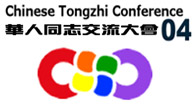As the US wrestles with the issue of same-sex marriage, the gay community in China is a long way from such debate, though delegates to the Fifth Tongzhi Conference in Hong Kong earlier this month are optimistic about the future.

Many attended the conference which ran from May 2-5 with financial assistance of the Chi Heng Foundation and a US$6,000 donation from the City University of New York, says Tongzhi Conference official Newman To Man Hing. Other delegates came form Taiwan, Hong Kong, Malaysia, the US, Canada and France.
"One of our focuses this year was to look at issues relevant to the mainland," To says through a translator. One session looked at the Tongzhi community in China's southwest, which takes in Yunnan and Sichuan.
Outside the major cities, there are very few resources for Tongzhi, which translates literally as comrades. It is not a concern to the government. NGOs are trying to do something in cooperation with local authorities, mainly to do with AIDS education. The Hong Kong-based Chi Heng Foundation is very active in this area.
"The Tonghzi in China are not well organised," To says. "But there are many websites, and some hotlines specifically for legal and AIDS issues.
"The internet is very important to gays in China. Given the size of the country, it is the most suitable form of communication, and the emergence of an increasing number of Internet bars makes it relatively easier to get online."
The conference heard that China has not so much one gay community as thousands, which have sprung up in major cities and provinces, thanks to the Internet.
Socially, there is an increasing number of bars, coffee shops and saunas - but the police remain vigilant and mount raids, ostensibly to check for drug use or prostitution, To says, on the grounds of "protecting the morals of society."
"Coming out is certainly the biggest issue for mainlanders. If you are not married by a certain age, there will be a lot of pressure from within the family, and in the workplace there will be discrimination, because an unmarried person is seen as not capable of responsibility," To says.
"Being single, no matter your sexual orientation, is a stigma."
To says the conference mood was one of optimism for the future. "As more people gain access to the Internet, their perceptions of what it means to be gay have improved."
Outside the major cities, there are very few resources for Tongzhi. It is not a concern to the government. NGOs are trying to do something in cooperation with local authorities, mainly to do with safe sex and Aids education. The Hong Kong-based Chi Heng Foundation is very active in this area.
In Taiwan, the Tongzhi are attempting to take the political route to secure recognition and law reform, but so far President Chen is all talk and no substance. The Taiwanese Hotline Organisation reported increasing numbers of calls from parents of gay children and a support network may be set up to help them cope with "isolation."
In Hong Kong, which lacks any political will for change, it's very much the case that minorities make use of the courts to bring about change, To says.
The first Tongzhi Conference was held in Hong Kong in 1996, with subsequent gatherings in 1998 and 1999. In 2001, the conference convened in Taiwan, and was to return to Hong Kong in 2003, but SARS forced its cancellation.
There is discussion among the Tongzhi to hold next year's conference in China.
